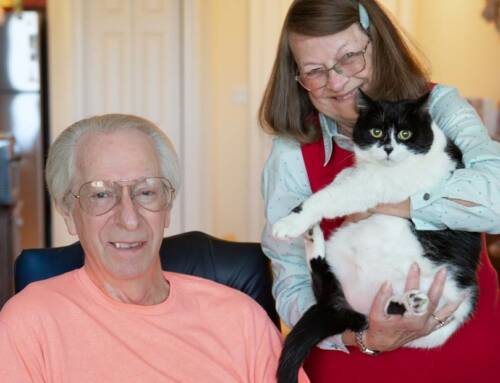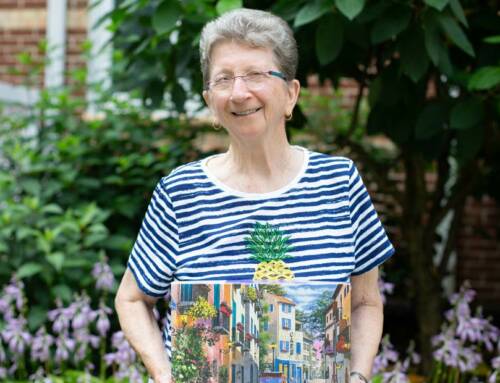
Therapeutic recreation staff use iN2L computer software to engage with residents
During this time of social distancing with COVID-19, Masonic Villages residents in nursing care and personal care areas may feel lonely or isolated from largely staying in their rooms and not being able to visit with their loved ones.
Recreation therapists, social workers and other staff across the state are working hard to keep residents occupied, whether it’s by connecting them to family members via video chat, reading their mail to them, helping them with an art project, or more.

Matt Mayo, assistant executive director/nursing home administrator, calls virtual bingo at Masonic Village at Elizabethtown
“We spend one-on-one time with the residents on a daily basis,” Angela Hurst, director of recreation at Masonic Village at Lafayette Hill, said. “I’ve done everything from giving hand massages to residents to doing nail spas. We’ve been doing FaceTime with the residents, reading their mail to them, playing games in their rooms, i.e. Scrabble, trivia, and giving out adult coloring books, word searches and crossword puzzles, too.”
Residents also have access to the iN2L (It’s Never 2 Late) computer software, which provides content-driven engagement to create meaningful experiences for older adults by connecting them to the world around them.
Emily Connors, therapeutic recreation and life enrichment supervisor at Masonic Village at Elizabethtown, said she and her staff have coordinated more than 200 video chats each week for personal care and health care residents and their families. “We also do social visits with the residents, based on their interest, that include cognitive games, card games, reminiscing – it depends on the individual,” she said.
Emily has been promoting new programming options, including the use of virtual reality equipment. Residents wear special eye goggles and are able to engage with other residents in their rooms while viewing the same content.
“Right now we are letting the residents try out the equipment, and they’ve really enjoyed it,” Emily said. “They can play games, like ‘I Spy’ and ‘Balloon Popper’ or travel, reminisce and explore locations virtually to keep it fun and engage their minds.”
Another popular program there is virtual bingo, which is held once a week on Fridays.
“All the residents can play at the same time on their television screens, and I’m in the auditorium calling the numbers into a microphone that comes through their television,” Emily said. “Whoever wins bingo rings their call bell and gets a prize.”
Emily and her staff are using more live stream programming to reach a lot of residents.
“We’re working with music therapy, spiritual care, wellness and therapy departments to provide a balance of leisure opportunities touching on the physical, cognitive, social and creative domains,” she said.
Emily feels the variety of programming at the village is making a difference in the residents’ spirits.
“The video chats make a huge difference to residents and family members,” she said. “A lot of residents look forward to bingo on Friday. We’re really trying to engage residents with the livestream programs so that they are not just watching TV.”
Richelle DiVito, personal care recreation coordinator at Masonic Village at Sewickley, assists with FaceTime and video chats, including connecting couples living in separate areas of campus, such as nursing and retirement living.
“I think the biggest benefit of the FaceTime calls is the comfort it brings the couples in simply being able to see each other,” Megan Zivic, Sewickley’s music therapist, said. “They are used to visiting their spouse every day, and although FaceTime can’t replace the feeling of holding hands or physically being in the same room, it helps a great deal in creating a special connection during this time.”
ACTIVITIES RESIDENTS CAN DO TO STAY ACTIVE WHILE SOCIAL DISTANCING
- Word searches, crossword puzzles, adult coloring books
- Listening to music and singing along to their favorite tune
- Phone calls or video chats with family
- Spring cleaning their living accommodation (if they’re able to do so)
- Stretching exercises on their own or in a chair
- Knitting or sewing
- Reading and writing letters, poetry, or a short story
- Reading books (large print especially)
- Keeping a daily gratitude list or starting a journal
- Art projects
- Engaging in hobbies that bring them joy
- Exploring internet resources for researching genealogy (i.e. Ancestry.com)
- Connecting with loved ones via social media
- Reaching out to church or community organizations to connect with others who may be feeling isolated or lonely.




